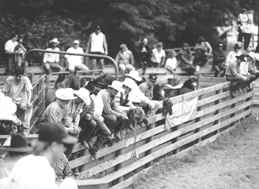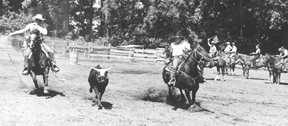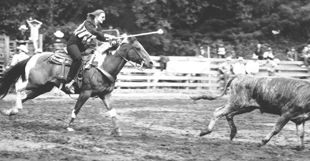

by Tiffany Lee-Youngren

WALT GIACOMINI HAS ONE piece of advice for anyone who wants to live the easy life: "Never work for a man who has cows or lights in his barn."
Giacomini should know. With 600 beef cattle on a ranch in Ferndale, he's spent countless days and nights herding, branding, buying and selling cattle.
And he's not the only one.
According to the 1995 state Agricultural Commisioner's report, the nearly 200 cattle-ranching outfits in Humboldt County contribute $10 million to the North Coast economy. Some ranching families, like the Russ family of Ferndale, have been roping cows since the days of the Gold Rush. Giacomini said most ranches are handed down from father to son, or from ranch owner to ranch manager.
This community of ranchers knows the meaning of hard work. But as any cowboy or cowgirl will tell you: All work and no play makes for one dull day of ropin' cattle.
So what do cowboys do for fun on their day off?
What else? They rope cattle.
The 30th annual Rodoni Roundup, known among ranching circles as a "playday," was held May 9 at the Humboldt County Fairgrounds. Ranching folks from all over Humboldt County came to participate in events such as team roping, steer stopping and cow daubing timed versions of the everyday activities that go on at a cattle ranch. Although not a true "rodeo" in the traditional sense of the word, a roundup is a way for cattlemen and women to show their skills at handling cows.
"This is a chance for families to get together and play and have a good time," said Giacomini, who helped organize the event. "It's a neat part of the industry."
And the roundup is truly a family affair. Nearly everyone in attendance has a brother or sister, uncle or cousin participating in the events.
Billy Bugenig is a 17-year-old ranch hand and Ferndale High junior. He attended the roundup with his father Lou and uncle Clare, who own ranches in Ferndale and Blocksburg. Bugenig said part of the appeal of the roundup is the friendly, supportive atmosphere it creates.
"The sport itself is pretty family-oriented," he said. "(There are) kids running around here and you don't have to worry about them getting kidnapped. Everybody likes everybody."
Bugenig said even the competition in the rodeo arena stays friendly.
"You don't wish anybody bad luck, but you wish yourself good luck. That's the thing about rodeo. If (someone else) wins, I'm just as happy. That's what makes it different from every other sport." 
What also makes rodeo different from other sports is the scarce amount of money available to winning participants. Big rodeos, such as those held in Cheyenne, Wyo., and Fort Worth, Texas, shell out up to $20,000 for the grand prize. And the National Finals Rodeo in Las Vegas can earn a winning cowboy up to $150,000.
But small rodeos, like the Rodoni Roundup, simply don't have the funds to award cattlemen and women large cash prizes.
"Hardly any people in rodeo make money," said Shane Radelfinger, a 25-year-old rodeo veteran from Healdsburg in Sonoma County. "It's very depressing because I think most of the rodeos are making money off the cowboys."
So why keep at it?
"I think it's an addiction," Radelfinger said, hopping down from the fence surrounding the arena. "Once you start rodeoing, it's very hard for people to quit."
Bugenig agrees.
"There ain't much glamour," he said. "But you just get to like it. It gets in your blood."
Another Humboldt County rancher with the "rodeo bug" is 2nd District Supervisor Roger Rodoni. When he's not participating in the political arena, Rodoni can be found in the rodeo arena, announcing events at both the Roundup and the coming Redwood Acres Fair and Rodeo Cattlemen's Day on June 26. It's for Rodoni's father that last month's roundup is named.
Rodoni said the roundup is more than just a way for ranchers to have fun. He pointed out the social, economic and political benefits.
"This is one of those social events where we can carry on the traditions of the lifestyle. And it's very important economically to get together and talk about the business. Politics have a great effect on our ability to do business. We're out-voted on land use issues by people who haven't got a clue."
Rodoni, who teaches six agriculture courses at College of the Redwoods, said most people don't know much about the beef cattle ranching industry itself. The roundup is one way for the public to become informed about how the steak on the barbecue came to be.
"So many people are removed from the production process," he said. "Less than 2 percent are involved in agriculture (and) 98 percent have very little or no connection, knowledge or ability to relate to where their (food) comes from.
"Their groceries come from the supermarket. That's it. The connection ends there."
Of course, some people, namely animal rights activists, do claim to have a special connection with the cattle involved in the beef ranching industry and cringe at the treatment the animals receive.
But Radelfinger says that most ranchers are careful not to harm their animals.
"There are a lot of people that do treat their animals bad, but ranchers want to take care of their animals the best they can. That's how they make their money."
Lou Mora, an agriculture business junior at Chico State and the son of an auction yard owner in Fortuna, said the animals involved in rodeos are treated better than some family pets.
"They buck eight seconds and they get pampered," he said.
But, Mora said, rodeo is hard on the animals, mainly because they're running at speeds not typical on the ranch.
"On the ranch you do things slowly," Mora said. "You sneak up on them. The less stress, the better off they are."
So why speed things up in the arena? Why make a competition out of the hard work involved in ranch life?
Radelfinger doesn't hesitate to reply.
"Because there's no better feeling than winning."